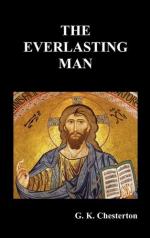
|
| Name: _________________________ | Period: ___________________ |
This test consists of 15 multiple choice questions and 5 short answer questions.
Multiple Choice Questions
1. What reason does Chesterton give that the experiences of the three initial elements of religion cannot be responsible for the rise of mysticism?
(a) No cave art depicts these three things.
(b) Religion is much more complex than the mingling of three experiences.
(c) They are also the experiences of animals who have not become mystics.
(d) They do not provide truth.
2. What support does Egypt give to Chesterton's argument?
(a) Barbarism can exist in complicated civilizations.
(b) Great civilizations arose throughout history.
(c) Evidence that the state grew more despotic as it grew more civilized.
(d) Evidence that the most powerful leaders are revered as gods.
3. Despite the level of sincerity a myth might be understood, what does Chesterton say is still present?
(a) Fundamental belief.
(b) Reality and religious sentiment.
(c) Superficiality.
(d) Skepticism.
4. What parallel does Chesterton draw with the uniqueness of the Christian church?
(a) The uniqueness of the situation of the Jewish people.
(b) The uniqueness of fire compared to painted fire.
(c) The uniqueness and variation inherent to fine wine.
(d) The difference between a fine race horse and a donkey.
5. What statement is intuitively understood, according to Chesterton, regarding the cave paintings?
(a) Cave men were child-like.
(b) Art is the signature of man.
(c) All of these.
(d) Cave men were closer to the beasts around them.
6. What does Chesterton label as the biggest weakness of science in trying to understand the origins of man?
(a) The scientists.
(b) None of these.
(c) The inability to experiment or directly observe.
(d) Theories that are sensational but untrue.
7. What two civilizations does Chesterton use for evidence against much of the belief in his time about cave men?
(a) Rome and Greece.
(b) Egypt and Rome.
(c) Egypt and Babylon.
(d) Egypt and Mazatlan.
8. What reason does Chesterton give for acts of cannibalism?
(a) The people are doing the worst thing they can imagine.
(b) The people believe the power of life is transferable.
(c) The lack of a true creed and religion.
(d) It is practical for those without the morality to know it is an abomination.
9. What does Chesterton say has been done too much to mythologies of the world?
(a) Analyze their origins.
(b) All of these.
(c) Look for common themes.
(d) Study them scientifically.
10. What place does Chesterton say was the center of antiquity?
(a) Egypt.
(b) Babylon.
(c) The Mediterranean.
(d) Mecca.
11. Which of the following is something Chesterton says future scientists will deduce from 20th Century initials carved in stone?
(a) The 20th Century did not practice the art of sculpture.
(b) The 20th Century had no religion.
(c) All of these.
(d) The 20th Century had no cursive or small letters.
12. According to Chesterton, why are pagan religions so successful and enduring?
(a) They are the only way available to glimpse god.
(b) They have seeds of truth.
(c) They combine reason and religion.
(d) Mankind finds it natural and empowering to worship something.
13. What does Chesterton propose to accomplish in the book "The Everlasting Man"?
(a) Convert the disbelieving to Christianity.
(b) Explain the importance of the religion.
(c) Disprove modern anthropological theories of the origins of mankind.
(d) Show the uniqueness of the Christian church and of man.
14. In what way does Chesterton say the the Christian is worse than the pagan in examples such as Mexico and Carthage?
(a) He is worse because he is better at justifying his actions.
(b) He is worse because he inflicts his wrath on other peoples.
(c) He is worse because he is more evolved.
(d) He is worse because it is his business to be better.
15. What example does Chesterton give about how the church must be viewed?
(a) From the daily experiences within it.
(b) With the wonder of somebody seeing it for the first time.
(c) With the eyes of an anthropologist.
(d) With the detached impartiality of a martian.
Short Answer Questions
1. What does Chesterton say the cross represents?
2. What does Chesterton think of the theory that mankind is solely motivated by economic reasons of subsistence?
3. To what popular religious practice of his time does Chesterton object?
4. What does Chesterton say should not be done with mythologies?
5. Which of the following is a statement Chesterton makes about paganism?
|
This section contains 785 words (approx. 3 pages at 300 words per page) |

|




